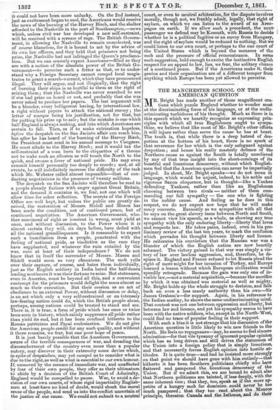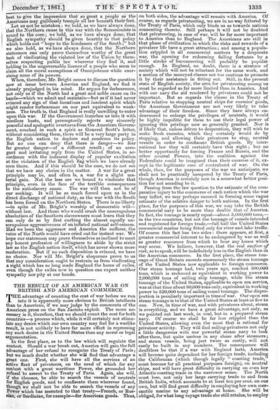never asked to produce her papers. The last argument will
. Bright has made another of those magnificent ora- be a blunder, every belligerent having, by international law, tions which puzzle England whether to wonder most ducting negotiations in the presence of twenty millions. language, which would be unjust, indeed, to his noble and The despatch on the San Jacinto will therefore be read to vigorous Saxon eloquence, but in thought—like a Yankee a people already furious with anger against Great Britain, defending Yankees, rather than like an Englishman and the demand it contains is, we fear, not one which will choosing between two rivals — neither of them com- allow time for sober reflection. The secrets of the Foreign manding our full sympathy. — the one who is fighting Office are well kept, but unless the public are greatly de- in the nobler cause. And feeling as he does in this ceived, the restoration of Messrs. Slidell and Mason has respect, we do not expect nor hope that he will make been made the condition, not of continued peace, but of many converts. Earnestly as we sympathize with all that continued negotiation. The American Government, whe- he says on the great slavery issue between North and South, ther convinced of right or insolent in wrong, must yield at we cannot view his speech, as a whole, as showing any true once, and without discussion, to the Power whom it is sympathy with the only enduring liberty—liberty that loves almost certain they will, six days before, have defied with and respects law. He takes pains, indeed, even in his pre- all the national grandiloquence. Is it reasonable to expect liminary review of the last ten years, to mark the confusion such a humiliation from a people, penetrated with the which pervades his thought between liberty and licence. feeling of national pride, as vindictive as the race they He reiterates his conviction that the Russian war was a have supplanted, and whatever the ruin entailed by the blunder of which the English nation are now heartily war, sure at least of their independence ? We do not ashamed. The victory gained in that war was simply a vic- know that in itself the surrender of Messrs. Mason and tory of law over lawless aggression, and, therefore, he de- Slidell would seem so very obnoxious. The mob yells spises it. England and France refused to let Russia plead the over their capture, of course, and hates them individually, right of mere might for her invasion of Turkey, and Europe best to give the impression that so great a people as the Americans may guiltlessly trample all law beneath their feet. Let us not be mistaken : we hold, as we have always done, that the Northern cause in this war with the Secessionists is sound to the core ; we hold, as we have always done, that English sympathy should be given heartily to that policy which holds out " hope to the bondsmen of the South ;" but we also hold, as we have always done, that the Northern statesmen can only prove themselves worthy of the great task of vindicating the violated law of the Union by them- selves respecting public law wherever they find it, and holding in the ungovernable licence of a people who seem to claim all the moral exemptions of Omnipotence while exer- cising none of its powers.
When, therefore, Mr. Bright comes to discuss the question now at issue between America and England, we find it already prejudged in his mind. He argues for forbearance, not only as if the North bad a great and noble cause on its hands—which we admit and maintain—but as if it had never evinced any sign of that licentious and insolent spirit which might render forbearance on our part equivalent to weak- ness. The truth is, that England is really unwilling to enter upon this war. If the Government launches us into it with needless haste, and peremptorily rejects any sincerely peaceful and apologetic overtures from the American Govern- ment, couched in such a spirit as General Scott's letter, without considering them, there will be a very large party in the English nation to deplore and condemn its policy. But no one can deny that there is danger—we fear far greater danger—of a different result ; of an arro- gant and irritating reply from the United States, in ac- cordance with the indecent display of popular exultation at the violation of the English flag which we have already seen there. And if this should be the case, we do not see that we have any choice in the matter. A war for a great principle may-_be, and often is, a war for a slight ma- terial gain. Not the less are we bound to vindicate that principle, even in the face of the terrible consequences to the anti-slavery cause. The war will then not be of our seeking. It will be as much forced upon us in the direct discharge of national duty, as the war with the South has been forced on the Northern States. There is no liberty —in spite of Mr. Bright's worship of democratic will— without law. And those who would crush the unscrupulous absolutism of the Southern slaveowners must learn that they can only do so by first curbing the almost equally un- scrupulous aggressiveness of an inflated national self-esteem. Had we been the aggressor and America the sufferer, the voice of the North would have cried out for instant war. We hope our statesmen may prove themselves as inclined to meet any honest profession of willingness to abide by the strict law as the English nation itself, which has never shown more moderation. But if no such disposition is evinced, we have no choice. Nor will Mr. Bright's eloquence prove to us that any consideration ought to restrain us from vindicating a right which has so long made England the home of exiles, even though the exiles now in question can expect neither sympathy nor pity at our hands.































 Previous page
Previous page